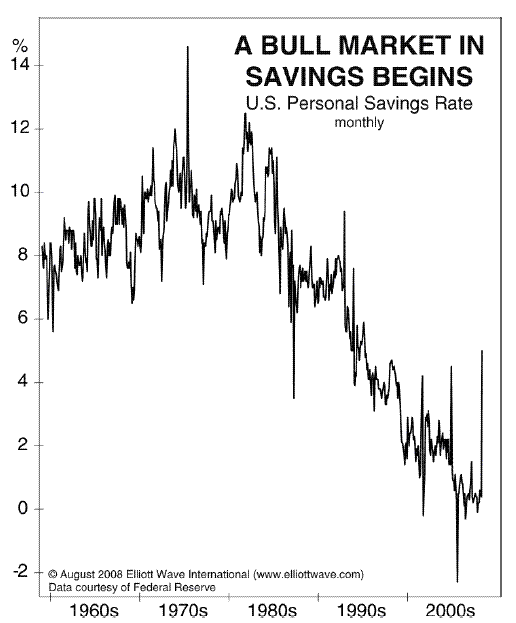Has Cash Been King for the Past 10 Years?
If you’re like most investors, you’ve been nearly brainwashed with conventional market “wisdom” that stocks are the best way to grow your portfolio.
You would be crazy not to have your money in the markets, right?
But when markets drop, as we’ve seen in this credit crisis, it’s amazing how quickly the story changes.
Steve Hochberg and Pete Kendall, editors of Elliott Wave International’s Financial Forecast, challenged the notion of stocks’ superiority years before this latest downturn.
Learn how cash has been king – and will remain so – far longer than the latest news headlines may have you believe in this free excerpt from Elliott Wave International’s Credit Crisis Survival Kit.
Elliott Wave International has also made the full Credit Crisis Survival Kit available free for a limited time. In addition to this excerpt, it contains 14 other articles, reports, and videos that reveal how to survive and prosper during the credit crisis. Visit EWI to download the kit, free.
Cash’s Invisible Reign Made Visible
[excerpted from Elliott Wave Financial Forecast, August 2008]
With respect to cash and its status as the preeminent financial asset, however, we are starting to wonder if investors will ever come around to our point of view, which, as we explained in the March special section, is that there are times when “the phrase ‘focus on the long term’ means “get out and wait.'” As we also pointed out, the last eight years are clearly one of these times, as cash has outperformed all three major stock averages over this period. A July 3 USA Today article shows how this outlook is actually becoming more farsighted as the bear market intensifies:
3-month Treasuries Beat
S&P 500 for past 10 Years
The article says, “Investors who bought stocks for the long run are finding out just how long the long run can be.” But the farther back in time cash’s dominance stretches and the rockier the stock market gets, the farther investors seem to move from ever taking anything off the table. After stating that “there can be times, long times, when stocks won’t beat T-bills,” a professor and popular buy-and-hold advocate is cited as “optimistic that the next 10 years will be better than the past decade.” In March EWFF stated, “Cash will continue to outperform until stocks are no longer fashionable.” There is no sign that such a condition is even close to happening.
It’s somewhat amazing that cash is not capturing anyone’s fancy because a tremendous society-wide thirst for cash is spreading fast. “In a deflation,” the Elliott Wave Financial Forecast has stated, “Rule No. 1 is to unload everything that isn’t nailed down. Rule No. 2 is to sell whatever everything remaining is nailed to.” The banking system is surely deflating, because, echoing Elliott Wave Financial Forecast’s wording again, “Desperate American Banks Are Selling Everything That Isn’t Nailed Down.” SunTrust is selling its stock in Coca-Cola, an asset the bank held for 90 years. Merrill Lynch sold its founding stake in Bloomberg as well as various other subsidiaries.
Meanwhile, “Americans are selling prized possessions online and at flea markets at alarming rates.” Pawnshops and auction sites are booming. At Craigslist.org, the number of for-sale listings soared 70% in eight months. This fits with our review of Craigslist’s prospects when it was getting started in 2005: “This is just the set-up phase. Once the global garage sale really gets rolling, truly astounding volumes of dirt-cheap goods will be available on-line and elsewhere.” The global garage sale is on. The chart of the U.S. savings rate shows that the bull market in cash has come to life.
 |
A 30-year downtrend in savings rates ended at minus 2.3% in August 2005. In May 2008, the savings rate skyrocketed to 5%. This jolt may be somewhat overstated due to the arrival of the government’s stimulus checks, but the burst should be the start of a critical new mindset among consumers. When the government showered the economy with $600 checks, many did something they never would have thought of through most of the bull market: They put the money in the bank, which is exactly what the administration did not want. In fact, federal, state and local governments are desperate for the tax revenue that a little ripple-effect spending would have generated.
According to the National Conference of State Legislatures, states must close a $40 billion shortfall in the current fiscal year. “The problem today is that tax revenue is vanishing,” says a story about the sudden appearance of the worst fiscal crisis in New York since 1975. Even cities like East Hampton, New York, where someone paid $103 million for an oceanfront house last year, are out of money. “Nobody understands how it happened,” says one resident. The pages of this newsletter show otherwise. If we are right, a deflationary decline is depleting and destroying cash flows in novel new ways that no one alive has experienced before.
The previous analysis was excerpted from Elliott Wave International’s Credit Crisis Survival Kit. The kit, featuring 15 free resources to help you survive and prosper during the credit crisis, is available free. Visit EWI to download the kit, free.